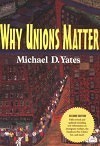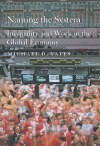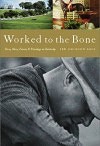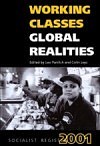Immigration
Many of the informal economies operating in the world today are the offspring of globalization and need to be understood as such. The economic and social prospects for people engaged in informal employment-sometimes referred to as “precarious” and “off-the-books employment”-as well as their families and communities, are substantially inferior to those associated with formal employment, and the current boom of informal economic activity bodes ill for all working people | more…
For forty years, AFL-CIO leaders George Meany and Lane Kirkland saw unorganized workers as a threat when they saw them at all. They drove left-wing activists out of unions and threw the message of solidarity on the scrapheap. Labor’s dinosaurs treated unions as a business, representing members in exchange for dues, while ignoring the needs of workers as a whole. A decade ago new leaders were thrust into office in the AFL-CIO, a product of the crisis of falling union density, weakened political power, and a generation of angry labor activists demanding a change in direction. Those ten years have yielded important gains for unions. Big efforts were made to organize strawberry workers in Watsonville, California, asbestos workers in New York and New Jersey, poultry and meatpacking workers in the South, and health care workers throughout the country. Yet in only one year was the pace of organizing fast enough to keep union density from falling | more…

In this new edition of Why Unions Matter, Michael D. Yates shows why unions still matter. Unions mean better pay, benefits, and working conditions for their members; they force employers to treat employees with dignity and respect; and at their best, they provide a way for workers to make society both more democratic and egalitarian. Yates uses simple language, clear data, and engaging examples to show why workers need unions, how unions are formed, how they operate, how collective bargaining works, the role of unions in politics, and what unions have done to bring workers together across the divides of race, gender, religion, and sexual orientation. | more…
At the outset of this closely argued history of Mexican capitalism, James Cockcroft asks, “How long will the majority of Mexicans put up with being exploited on both sides of the Mexican-U.S. border? ” | more…

The economic boom of the 1990s created huge wealth for the bosses, but benefitted workers hardly at all. At the same time, the bosses were able to take the political initiative and even the moral high ground, while workers were often divided against each other. This new book by leading labor analyst Michael D. Yates seeks to explain how this happened, and what can be done about it. | more…

Worked to the Bone is a provocative examination of race, class and the mechanics of inequality in the United States. In an engaging and accessible style that combines thoroughly documented sociological insight with her own compelling personal narrative, Pem Buck illustrates the ways in which constructions of race and the promise of white privilege have been used at specific historical moments in two Kentucky counties to divide those who might have otherwise acted on common class interests. | more…

Socialist Register 2001 examines the challenges faced by workers and the labor movement under global capitalism in the new century. This collection of twenty timely and original essays lay the groundwork for a much-needed revival of class analysis. A broad range of working-class issues are addressed including knowledge work and the “cybertariat” in the new economy, feminism and unions, migrant labor, peasant struggles, internationalism, and the impact of unstable, casual, and contingent employment. Other essays examine critically important regional experiences in India, Iran, Russia, Brazil, Southern Africa, and East Asia, as well as Europe and North America. Contributors to this volume reveal new and exciting possibilities for change that transcend the limits of old forms of class organization and politics. | more…

Big changes in the global economy and world politics have put new questions on the table for labor movements around the world. Can workers regain the initiative against the tidal wave of corporate downsizing and government cutbacks? Can unions revive their ranks and reignite the public imagination? Is labor rising from the ashes? | more…




